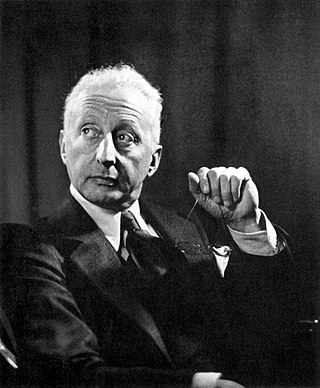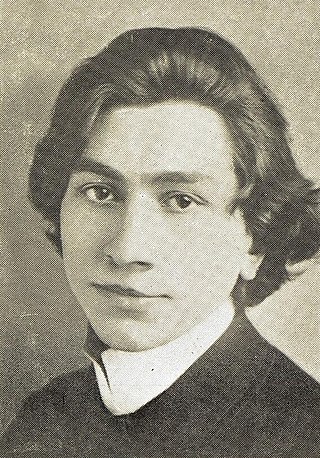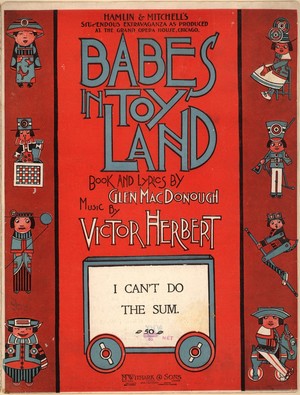Related Research Articles

Jerome David Kern was an American composer of musical theatre and popular music. One of the most important American theatre composers of the early 20th century, he wrote more than 700 songs, used in over 100 stage works, including such classics as "Ol' Man River", "Can't Help Lovin' Dat Man", "A Fine Romance", "Smoke Gets in Your Eyes", "The Song Is You", "All the Things You Are", "The Way You Look Tonight" and "Long Ago ". He collaborated with many of the leading librettists and lyricists of his era, including George Grossmith Jr., Guy Bolton, P. G. Wodehouse, Otto Harbach, Oscar Hammerstein II, Dorothy Fields, Johnny Mercer, Ira Gershwin and Yip Harburg.

Musical theatre is a form of theatrical performance that combines songs, spoken dialogue, acting and dance. The story and emotional content of a musical – humor, pathos, love, anger – are communicated through words, music, movement and technical aspects of the entertainment as an integrated whole. Although musical theatre overlaps with other theatrical forms like opera and dance, it may be distinguished by the equal importance given to the music as compared with the dialogue, movement and other elements. Since the early 20th century, musical theatre stage works have generally been called, simply, musicals.

A libretto is the text used in, or intended for, an extended musical work such as an opera, operetta, masque, oratorio, cantata or musical. The term libretto is also sometimes used to refer to the text of major liturgical works, such as the Mass, requiem and sacred cantata, or the story line of a ballet.

Otto Abels Harbach, born Otto Abels Hauerbach was an American lyricist and librettist of nearly 50 musical comedies and operettas. Harbach collaborated as lyricist or librettist with many of the leading Broadway composers of the early 20th century, including Jerome Kern, Louis Hirsch, Herbert Stothart, Vincent Youmans, George Gershwin, and Sigmund Romberg. Harbach believed that music, lyrics, and story should be closely connected, and, as Oscar Hammerstein II's mentor, he encouraged Hammerstein to write musicals in this manner. Harbach is considered one of the first great Broadway lyricists, and he helped raise the status of the lyricist in an age more concerned with music, spectacle, and stars. Some of his more famous lyrics are "Smoke Gets in Your Eyes", "Indian Love Call" and "Cuddle up a Little Closer, Lovey Mine".

Victor August Herbert was an American composer, cellist and conductor of English and Irish ancestry and German training. Although Herbert enjoyed important careers as a cello soloist and conductor, he is best known for composing many successful operettas that premiered on Broadway from the 1890s to World War I. He was also prominent among the Tin Pan Alley composers and was later a founder of the American Society of Composers, Authors, and Publishers (ASCAP). A prolific composer, Herbert produced two operas, a cantata, 43 operettas, incidental music to 10 plays, 31 compositions for orchestra, nine band compositions, nine cello compositions, five violin compositions with piano or orchestra, 22 piano compositions and numerous songs, choral compositions and orchestrations of works by other composers, among other music.

Charles Rudolf Friml was a Czech-born composer of operettas, musicals, songs and piano pieces, as well as a pianist. After musical training and a brief performing career in his native Prague, Friml moved to the United States, where he became a composer. His best-known works are Rose-Marie and The Vagabond King, each of which enjoyed success on Broadway and in London and were adapted for film.
The New Moon is an operetta with music by Sigmund Romberg and book and lyrics by Oscar Hammerstein II, Frank Mandel, and Laurence Schwab. The show was the third in a string of Broadway hits for Romberg written in the style of Viennese operetta. Set in 1792, shortly before the French Revolution, the story centers on a young French aristocrat in disguise, who has fled his country and falls in love with the daughter of a prominent New Orleans planter.

Rose-Marie is an operetta-style musical with music by Rudolf Friml and Herbert Stothart, and book and lyrics by Otto Harbach and Oscar Hammerstein II. The story is set in the Canadian Rocky Mountains and concerns Rose-Marie La Flemme, a French Canadian girl who loves miner Jim Kenyon. When Jim falls under suspicion for murder, her brother Emile plans for Rose-Marie to marry Edward Hawley, a city man.

Marinka is an operetta by Hungarian composer Emmerich Kálmán with book by George Marion, Jr. and Karl Farkas, and lyrics by George Marion, Jr. The operetta is a retelling of the story of the Mayerling Incident, but with a happy ending replacing the infamous 1889 double suicide of Austrian Crown Prince Rudolf and his mistress, Maria Vetsera. The best-known songs include "Only One Touch of Vienna," "Sigh by Night," "The Cab Song," and "When I Auditioned for the Harem of the Shah".

Babes in Toyland is an operetta composed by Victor Herbert with a libretto by Glen MacDonough, which wove together various characters from Mother Goose nursery rhymes into a musical extravaganza. Following the extraordinary success of their stage musical The Wizard of Oz, which was produced in New York beginning in January 1903, producer Fred R. Hamlin and director Julian Mitchell hoped to create more family musicals. MacDonough had helped Mitchell with revisions to the Oz libretto by L. Frank Baum. Mitchell and MacDonough persuaded Victor Herbert to join the production. Babes in Toyland features some of Herbert's most famous songs – among them "Toyland", "March of the Toys", "Go to Sleep, Slumber Deep", and "I Can't Do the Sum". The theme song "Toyland", and the most famous instrumental piece from the operetta, "March of the Toys", occasionally show up on Christmas compilations.

Arthur Reed Ropes, better known under the pseudonym Adrian Ross, was a prolific writer of lyrics, contributing songs to more than sixty British musical comedies in the late 19th and early 20th centuries. He was the most important lyricist of the British stage during a career that spanned five decades. At a time when few shows had long runs, nineteen of his West End shows ran for over 400 performances.
Rosalie is a musical with music by George Gershwin and Sigmund Romberg, lyrics by Ira Gershwin and P.G. Wodehouse, and book by William Anthony McGuire and Guy Bolton. The story tells of a princess from a faraway land who comes to America and falls in love with a West Point Lieutenant.
Mark Lamar Stewart, known by his stage name Stew, is an American singer-songwriter and playwright from Los Angeles, California, United States.

Song of the Flame is a 1930 American pre-Code musical film photographed entirely in Technicolor. Based on the 1925 operetta of the same name, the film features a screenplay by Gordon Rigby adapted from the musical book written by Oscar Hammerstein II and Otto A. Harbach for the operetta. The movies also features many of the songs from the operetta which used lyrics by Hammerstein and Orbach and music by George Gershwin and Herbert Stothart. The film was produced and distributed by First National Pictures. It was the first color film to feature a widescreen sequence, using a process called Vitascope, the trademark name for Warner Bros.' widescreen process. The film, based on the 1925 Broadway musical of the same name, was nominated for an Academy Award for Sound Recording. It is part of the tradition of operetta films, popular at the time.

J. Harold Murray was an American baritone singer and actor. For more than a decade, during the Roaring Twenties and the Depression Thirties, he contributed to the development of musical theater by bridging vaudeville, operetta and the modern American musical. The most popular American songs he introduced on Broadway included "Autumn in New York" ; "Let's Have Another Cup of Coffee" and "Soft Lights and Sweet Music" ; "Rio Rita", "The Kinkajou" and "The Rangers Song" ; and "Mandalay".
New Moon is a 1930 black-and-white American, pre-Code romantic/drama/melodrama musical film version of the operetta The New Moon, with music by Sigmund Romberg and book and lyrics by Oscar Hammerstein II and others. The original stage version premiered on Broadway in 1928. The 1930 film is also known as Komissa Strogoff in Greece, Nymånen in Denmark and Passione cosacca in Italy. A second adaptation, also titled New Moon, was released in 1940.

Oh, Lady! Lady!! is a musical with music by Jerome Kern, a book by Guy Bolton and P. G. Wodehouse and lyrics by Wodehouse. It was written for the Princess Theatre on Broadway, where it played in 1918 and ran for 219 performances. The story concerns an engaged young man, Bill, whose ex-fiancée arrives unexpectedly on his wedding day. Bill works to convince his old flame that he was not worthy to marry her, but his clumsy efforts do not make him look good to his new fiancée, whose mother already dislikes Bill. A couple of crooks cause further complications.

Leave It to Jane is a musical in two acts, with music by Jerome Kern and book and lyrics by Guy Bolton and P. G. Wodehouse, based on the 1904 play The College Widow, by George Ade. The story concerns the football rivalry between Atwater College and Bingham College, and satirizes college life in a Midwestern U.S. town. A star halfback, Billy, forsakes his father's alma mater, Bingham, to play at Atwater, to be near the seductive Jane, the daughter of Atwater's president.

Chaplin: The Musical, formerly titled Limelight: The Story of Charlie Chaplin, is a musical with music and lyrics by Christopher Curtis and book by Curtis and Thomas Meehan. The show is based on the life of Charlie Chaplin. The musical, which started at the New York Musical Theatre Festival in 2006, debuted at the La Jolla Playhouse in 2010, and then premiered on Broadway in 2012.

Development of musical theatre refers to the historical development of theatrical performance combined with music that culminated in the integrated form of modern musical theatre that combines songs, spoken dialogue, acting and dance. Although music has been a part of dramatic presentations since ancient times, modern Western musical theatre developed from several lines of antecedents that evolved over several centuries through the 18th century when the Ballad Opera and pantomime emerged in England and its colonies as the most popular forms of musical entertainment.
References
- 1 2 Dan Dietz (2019). "Song of the Flame". The Complete Book of 1920s Broadway Musicals. Rowman & Littlefield Publishers. p. 298-299. ISBN 9781538112823.